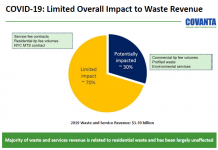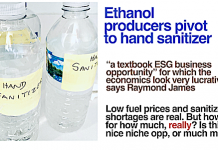By Neal Dikeman, Partner, Jane Capital Partners LLC, and Founding Contributor, Cleantechblog.com. He has no investments in or financial incentive related to ethanol or ethanol stocks.
Are ethanol stocks risky long-term investments? We think they are. Don’t get me wrong, I’m a big fan of ethanol blended fuels for a whole host of reasons, I just don’t like ethanol as an investment. Here are six solid reasons to be very, very cautious.
1. Demand vs. supply – As with most regulatory driven markets, the demand has come on very fast behind the advent of renewable fuel standards, fuel subsidies, and the phasing out of MTBE resulting in ethanol’s rise as an oxygenate of choice. As a result the demand has far outstripped the historically available supply, and while supply plays catch up the industry has done well. However, as any student of refinery cycles knows, the moment supply catches up with demand at point “n��? (and it will), the “n+1��? ethanol production will put tremendous price pressure on the market and drive the industry into its first down cycle. (Keep in mind, all those announcements about new ethanol plants are driving growth – but at the same time driving the industry straight for its own readymade cliff). 2. Massive commodity price risk – Ethanol companies, like refineries, typically find themselves at the mercy of massive commodity price cycles. Unfortunately for ethanol producers, they stand at the mercy of several price cycles – corn (which ethanol producers are driving up the cost of), natural gas (the primary fuel), gasoline and crude. When the confluence of cycles is in their favor – life is very good, but when it is bad, it will be very, very bad. Now, for grins, just imagine a bad cycle confluence at the same time supply outstrips demand. 3. Market size pressure – Also, the current volumes of ethanol are a few percentage points of total refining volumes, barely worth fighting over if you are an oil company (a typical ethanol plant is about 5% of the size of a typical refinery) – but if ethanol ever comes near the DOE’s 30% by 2030 goals, do you really expect the oil companies to give up market share easily – especially when they already own most of the blending and distribution? Trust me, it’s not going to be Exxon, BP, Shell, and ChevronTexaco that get crushed in the stampede (and probably not Ag giants like ADM). Just because ethanol succeeds does NOT mean ethanol companies will. 4. Technology change – As the industry matures, and each of these cycles and concerns comes into play, the emphasis on survival will move more and more to low cost and high efficiency – early players with older less efficient (and often smaller) plants may actually be at a disadvantage. On the technology side, I have recently seen technology programs working in everything from more efficient distillation columns to less energy intensive better water removal, to advanced catalysts. And as mature players take notice (oil giant BP is establishing a $500 million Environmental Bioscience Institute for R&D in part in this area), even the winners of the current land grab phase may not actually make money long-term. 5. Ethanol is fundamentally a high cost fuel – As a fuel, ethanol is a fundamentally higher cost feedstock and processing cost than gasoline – just because the oil industry sells gasoline for higher than the ethanol industry can produce it, does NOT mean ethanol is cheaper (an analysis which is so apples to oranges as to be difficult even to begin to dissect)!. I know a number of well known analysts and investors have come out stating the opposite, but the numbers don’t lie. From Is Ethanol Controversial? Should it Be?, by Vinod Khosla – “Ethanol production costs in the US today are about $1.00 per gallon before any subsidies or taxes, substantially cheaper than the production cost of gasoline, even if oil was to decline to the mid-40’s.��? They of course are forgetting that when looked at on a comparable cost basis – the full cycle actual cost to make gasoline from crude is on average up to half the comparable cost of ethanol from corn. Just because oil prices are high does NOT mean gasoline is expensive to produce, in large part it means oil companies that own reserves are making lots of profits. It is correct to say that when crude is at $60/barrel, it is economic to produce ethanol (and along with subsidies sell it for a tidy profit), but ethanol will be for now, our highest cost fuel. [Note: Look for our upcoming article on Cleantech Blog detailing the cost comparison] 6. Valuations – Bottom line, these are cyclical refineries producing a commodity product, not technology companies, and refineries typically trade at a TEV/EBITDA of the mid single digits, and a PE in the high single digits to low teens. Currently the ethanol market trades at hefty premiums to the pureplay oil refiners – a recent check had the average of VeraSun (VSE) & Aventine (AVR) trading at 80% higher PE and 110% higher Enterprise Value/EBITDA than the average of Sunoco (SUN), Tesoro (TSO) , and Valero (VLO) . Are these all possibly reasons pure plays like VeraSun and Aventine are trading at one-third and one-half off their 52 week highs respectively (See our earlier Cleantech Blog article on VeraSun’s IPO)? Conclusion – In the short run ethanol stocks are in a land grab phase ramping to meet demand, and some of these stocks may do well while demand still outstrips supply and the industry is still small, but when this dynamic changes – watch out as the margin pressure will be brutal, and could turn already aggressively valued stocks into a dot bomb style free fall as per gallon profits get crushed. So, make your profits while you can!









I tend to disagree. Although you are absolutelty right in everything you say, you have overlooked the small detail of current account flows. It may or may not be important to you that the United States has empowered its adversaries around the world by exporting hundreds of billions of dollars to oil producers. However most, well all politicians, except the Bush administration, think it is a problem. It is absolutely in our interest to subsidize alternative fuels so that we can control the price of oil, by deflating demand. I really do not care about your arguments over feestock shortages, which will be eliminated as we plant more acreage and develop alternative feedstocks. The companies that can position themselves as major producers now, will continue as early adopters of new technology. It is somewhat about establishing supply logistics and knowhow. Anyway, I am quite sure that you are really being paid by an oil company, so whoever you fooled – it wasn’t me, or the other investors who know the future value that alternative fuels represent. Also, the reason that the integrated oils are trading at half the multiples: 1) you neglected to mention that verasun and aventine are building out another 70% production, and their valuation actually underprices that income stream 2) your employer, the oil companies, are actually running out of crack to sell, so their income stream has a cutoff date.
I also disagree myself to one small detail, you seem to be in this twilight zone of competitive ignorance. Put it this way oil companies will falter in this way, people believe the o-zone layer is disapearing. People have started to get worried, now you say this is a problem, peole like you are the problem. We need to fix what we had no right to ruin. Any citizen on the planet is starting to understand and the fact is people WILL buy ethanol b/c they believe it, regardless of your theory’s and information, thats it healthy and probably will create more jobs for U.S citizens something overseas companies don’t have. Morw American Dollar staying in America another smart choice, stocks will go up
Chris